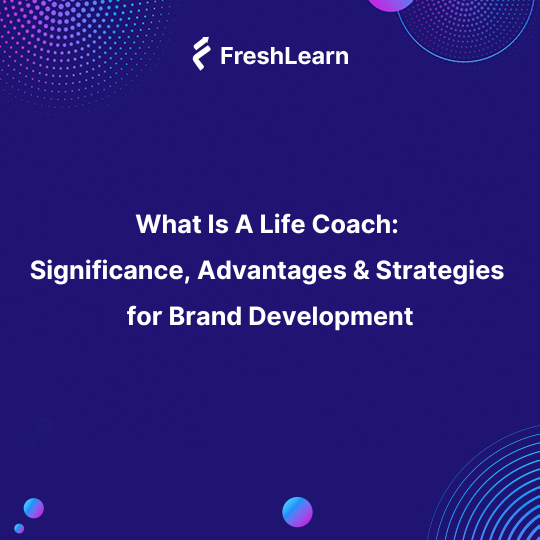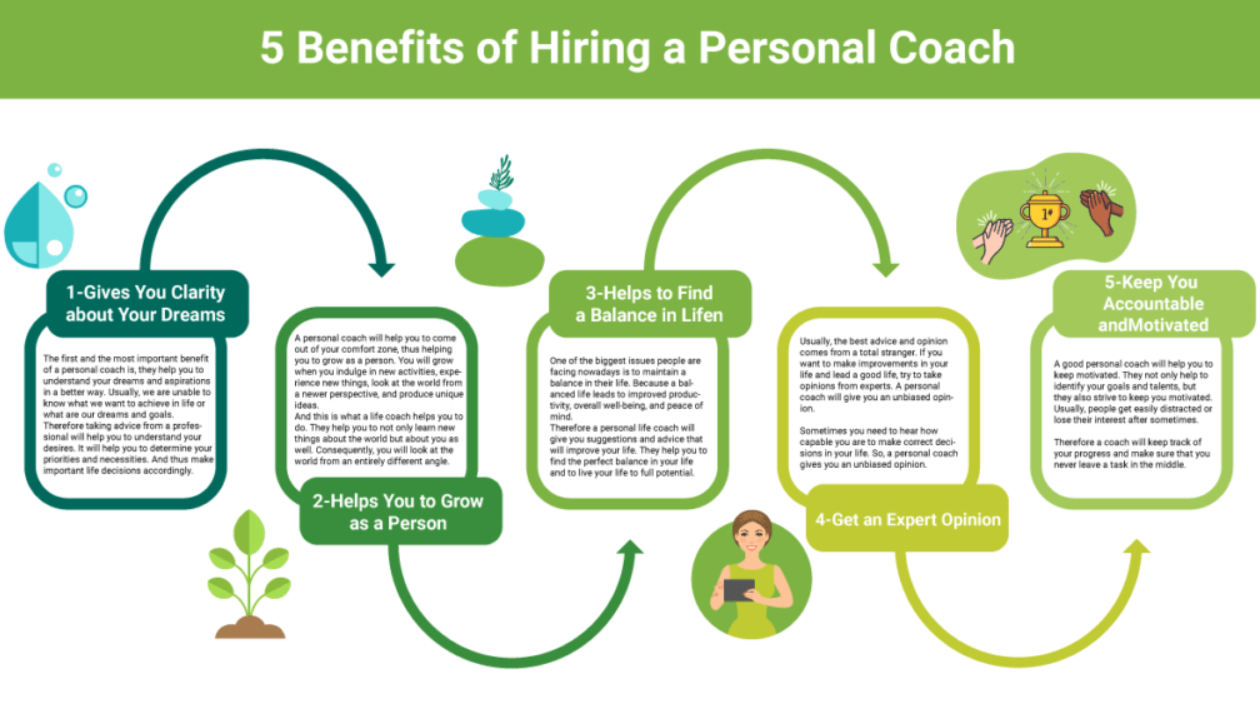
What Is A Life Coach: Significance, Advantages & Strategies for Brand Development
Ever wondered about the magical folks who help others conquer their goals, unravel their potential, and find their way in this crazy journey called life?
Yep, we're talking about life coaches! These modern-day guides have cracked the code to human behavior, motivation, and dreams, and they're here to show us the path to a better self.
Life coaches collaborate with their clients to create plans for overcoming challenges, enhancing performance, and improving quality of life in general.
In fact, 1.5 million searches are made every month for life coaches, business coaches, and executive coaches. Hence, the demand for this is going to keep on rising exponentially.
In this article, you get insight into the day-to-day activities of a life coach and how they can build their career. So, let’s first start with the definition of a life coach.
What Is a Life Coach?
Imagine having a life coach who serves as both a mentor and your strongest supporter. These experts are really committed to assisting you in achieving your goals as well as discovering inner peace and contentment.
Instead of just providing you with general advice, they work with you to identify your unique goals and any potential obstacles. They then give you an arsenal of psychological understandings, motivational approaches, and efficient goal-setting strategies.
It's like having that friend who shows you the proper path and provides a welcoming environment free from criticism. With their assistance, you can realize your full potential, aim high, and truly achieve the success and pleasure you desire.
Career coaching, relationship coaching, health coaching, and personal development coaching are just a few of the specialties available to life coaches.
As the saying goes, “Coaching isn’t therapy. It’s product development, with you as the product.” - Judy Hehr. Likewise, people need to incorporate coaching into their lifestyle and make an active choice.
Why Becoming a Life Coach Is a Good Career Choice?
There are various compelling reasons to seek a profession as a life coach, which provides both personal fulfillment and fun.
- To begin, a life coach's role comprises improving clients' lives by assisting them in accomplishing their goals and improving their overall quality of life.
- Second, for those who appreciate a harmonic work-life balance, life coaching offers an adjustable career path that allows for both in-person and distant forms of practice.
- Third, there is a growing trend of people using life coaches as partners in achieving their career and personal goals.
Furthermore, life coaching enables the choice of a specialized specialization linked with one's hobbies and areas of skill, promoting a sense of happiness and purpose in the job.
Furthermore, working as a life coach might provide great financial rewards.
This is especially true for individuals who build a sizable client base and establish strong brand recognition in their industry, hence presenting the possibility of a lucrative livelihood.
How to Become a Life Coach?
Being a life coach is a rewarding career that entails assisting people in achieving their professional and personal objectives. There are various measures you may take to become a prosperous life coach if you decide to follow this career route. Here are the crucial factors to take into account.
1. Research the Industry
Before diving into the world of life coaching, it's essential to conduct thorough research about the industry. Gain an understanding of what life coaching entails, the services provided, and the different approaches and techniques used.
This will help you make an informed decision about whether this career aligns with your interests and goals. You can explore various online resources and books, attend seminars, and connect with experienced life coaches to learn more about their experiences.
2. Identify your Niche
Life coaching is a broad field, and it's crucial to identify your niche or specialization based on your skills, expertise, and passions. Some different life coaches include:
a). Career Coaches:
These coaches specialize in helping individuals navigate their career paths, set goals, and make effective career-related decisions.
Example: A career coach may work with professionals who are seeking a career change or individuals who want to advance in their current jobs.
b). Relationship Coaches:
Relationship coaches focus on improving personal relationships, whether it's romantic partnerships, friendships, or family dynamics.
Example: A relationship coach may work with couples who are struggling with communication issues or individuals seeking guidance in forming healthier relationships.
c). Health and Wellness Coaches:
These coaches help individuals adopt healthier lifestyles, improve their physical and mental well-being, and set and achieve health-related goals.
Example: A health and wellness coach may work with clients who want to lose weight, manage stress, or develop healthy habits.
d). Financial Coaches:
Financial coaches assist individuals in managing their finances, creating budgets, and achieving financial stability.
Example: A financial coach may work with clients who want to get out of debt, start saving, or plan for retirement.
c). Personal Development Coaches:
Personal development coaches focus on self-improvement, personal growth, and maximizing potential in various aspects of life.
Example: A personal development coach may work with clients who want to boost their confidence, enhance their leadership skills, or overcome limiting beliefs.
3. Obtain Certification
Obtaining certification is a crucial step on the path to becoming a skilled and effective life coach. Certification not only validates your competence, but it also provides you with a solid foundation of knowledge and abilities.
Enrolling in reputable coaching programs or institutions that offer recognized certifications allows you to delve into various coaching techniques, communication strategies, ethical considerations, and psychological principles essential for guiding individuals toward personal and professional growth.
These programs often include practical training, supervised coaching sessions, and assessments, enabling you to hone your abilities under expert guidance. Having a recognized credential not only gives your clients confidence, but it also reflects your dedication to maintaining high levels of professionalism and competency as you continue on your path as a life coach.
What to Expect From a Life Coach? 8 Key Benefits of Hiring a Life Coach
Hiring a life coach can provide numerous benefits and support in various areas of your life. Here are some key points to consider when it comes to what to expect from a life coach.

1. Clarifying Goals and Vision
A life coach guides you in discovering a profound understanding of your personal and professional ambitions. They collaborate with you to crystallize your core values, recognize your capabilities, and express a well-defined outlook on your forthcoming journey.
Employing insightful inquiries and attentive engagement, a life coach assists you in revealing your genuine priorities, setting the stage for pursuing your sought-after achievements.
2. Accountability and Motivation
One of the significant advantages of working with a life coach is the built-in accountability and motivation they provide. Life coaches hold you responsible for the actions and commitments you make toward your goals.
They help you create actionable plans, set milestones, and provide ongoing support and encouragement. With a life coach, you are more likely to stay focused, overcome obstacles, and stay motivated throughout your journey.
3. Personal Development and Growth
Life coaches possess expertise in personal development techniques and methodologies aimed at facilitating the exploration and enrichment of your self-awareness.
They provide guidance in recognizing and surmounting restrictive beliefs, apprehensions, and self-questioning that might impede your progress toward realizing your utmost potential.
Through collaboration with a life coach, you can nurture a mindset oriented towards growth, acquire fresh proficiencies, and unlock your innate capacities.
4. Improved Decision-Making
Life coaches excel in steering you toward well-considered and impactful choices. They facilitate a deeper comprehension of your alternatives, aid in evaluating their advantages and disadvantages, and encourage the exploration of various viewpoints.
Utilizing attentive listening and insightful inquiries, a life coach supports you in attaining lucidity, minimizing uncertainty, and arriving at decisions that resonate with your core values and overarching aspirations.
5. Enhanced Self-Confidence
Engaging with a life coach holds the potential to elevate your self-assurance and belief in yourself. Within a secure and non-critical environment, they offer the opportunity to candidly address your apprehensions, vulnerabilities, and hurdles.
By guiding you in acknowledging and commemorating your competencies and accomplishments, a life coach bolsters a constructive self-perception. This enhanced self-confidence subsequently empowers you to embrace risks, venture beyond familiarity, and wholeheartedly chase after your ambitions.
6. Improved Relationships and Communication
Life coaches play a crucial role in enhancing your interpersonal skills and nurturing better relationships. They offer valuable insights into refining your communication abilities, honing active listening, and mastering conflict resolution strategies.
With a life coach's support, you can cultivate empathy, deepen comprehension, and forge more impactful personal and professional connections.
7. Work-Life Balance
Life coaches understand the significance of upholding a well-balanced relationship between your work and personal life. They provide valuable assistance in arranging your obligations, establishing limits, and efficiently handling your schedule.
With a life coach's expertise, you can navigate the process of seamlessly blending your personal and professional spheres, leading to decreased stress and heightened overall contentment and wellness.
8. Overcoming Obstacles and Challenges
Life coaches provide unwavering assistance in conquering hurdles and navigating through the twists and turns of your journey. They aid in recognizing potential roadblocks, crafting effective strategies to surmount them, and fostering a resilient attitude when confronted with setbacks.
Serving as a steadfast companion, a life coach places faith in your capabilities and empowers you to discover innovative resolutions to conquer every obstacle.
Difference Between a Life Coach And a Therapist
The difference between a life coach and a therapist lies in their focus, approach, and the nature of the support they provide. Here is a summarized table highlighting the differences between a life coach and a therapist:

Now, let’s take a detailed look at these key differences.
1. Setting Goals
Life Coach - Life coaches primarily focus on helping individuals set and achieve their personal and professional goals. They work with clients to clarify their vision, identify areas for growth, and create actionable plans to reach desired outcomes. Life coaches emphasize future-oriented goal setting and often work with individuals who are already functioning well but seek guidance and support to maximize their potential.
Therapist - Therapists, on the other hand, primarily focus on addressing and resolving mental health issues, emotional challenges, and psychological disorders. They work with clients to identify and understand the underlying causes of their difficulties, providing therapeutic interventions to promote healing and personal growth. Therapists often work with individuals experiencing emotional distress or mental health concerns.
2. Accountability
Life Coach - Life coaches provide accountability by helping clients stay focused, motivated, and committed to their goals. They hold clients responsible for the actions and commitments they make towards their desired outcomes. Life coaches employ strategies such as regular check-ins, progress assessments, and action plans to ensure clients are taking the necessary steps towards their goals.
Therapist - While therapists may encourage clients to take action and make positive changes in their lives, their primary focus is on providing a safe and supportive environment for exploration, understanding, and healing. Therapists offer a non-judgmental space where clients can openly express their thoughts and emotions without the pressure of immediate accountability.
3. Support in Addressing Challenges
Life Coach - Life coaches offer support in addressing challenges by helping clients develop problem-solving skills, explore alternative perspectives, and identify opportunities for growth. They provide guidance and encouragement to overcome obstacles and navigate through life transitions. Life coaches typically work with clients seeking personal development, improved performance, and enhanced well-being.
Therapist - Therapists provide support in addressing challenges by delving into the underlying psychological, emotional, or behavioral issues contributing to the client's distress. They utilize evidence-based therapeutic techniques to help clients gain insight, develop coping strategies, and heal from past traumas. Therapists often work with clients struggling with mental health conditions, relationship difficulties, or unresolved emotional issues.
3 Most Effective Ways to Create a Brand
Creating a strong brand is crucial for any business or professional, including life coaches. It helps you establish your unique identity, attract your target audience, and build trust and credibility. Here are effective ways to create a brand -
1. Bundling Your Services
One way to create a strong brand as a life coach is to bundle your services in attractive coaching packages. This involves packaging your coaching sessions, resources, and additional offerings into comprehensive programs that cater to your target audience's specific needs or goals. By bundling your services, you provide a clear value proposition to your clients and differentiate yourself from other coaches in the market.
For instance, as a career coach, you could offer a "Career Transition Package" that includes many one-on-one coaching sessions, a personalized career assessment, a resume review, and interview preparation. This package may also offer useful tools, such as resume makers like Rezi, which help clients create professional and optimized resumes. By using such tools, they can be guided in tailoring their resumes to specific job requirements, significantly increasing their chances of success.
This comprehensive package offers a holistic approach to career coaching, attracting clients specifically looking for support during career transitions.
In addition to coaching packages, you can also consider offering group coaching sessions or online courses. Group coaching provides an opportunity to work with multiple clients simultaneously, fostering a sense of community and shared learning.
Online platforms such as Freshlearn allow you to reach a broader audience beyond your local area and provide self-paced learning experiences. You can create different digital products and different services related to coaching, masterclasses, digital downloads, etc, without any coding knowledge!
2. Building Audience
Building an audience of individuals who align with your target market is important to create a brand. Understanding and effectively reaching your target market is key to building a strong brand presence. Here are some steps to consider -
Step 1 - Identify Your Target Market
Determine the specific group of people you want to serve as a life coach. Consider demographics, psychographics, and their unique needs and challenges. For instance, your target market may be mid-career professionals looking for work-life balance or entrepreneurs seeking guidance in growing their businesses.
Step 2 - Create a Buzz With Waitlist
Unsure whether your idea will turn out the way you want? Then you should test it out before going all in! You can build a waitlist with Freshlearn’s Idea Validator to set up a quick landing page. This can help you gain insight into your target audience’s current preferences and interests.
Step 3 - Develop Your Website
Create a professional and visually appealing website that showcases your brand, services, and expertise. Ensure your website is user-friendly, mobile-responsive, and includes a clear call-to-action for potential clients to contact you or sign up for your services. Use compelling content and testimonials to demonstrate your credibility and build trust.
Step 4 - Harness Social Media
Utilize social media platforms such as LinkedIn, Facebook, Instagram, or Twitter to connect with your target audience. Share valuable content about your coaching niche, engage with your followers, and participate in relevant communities or groups. Consistently demonstrate your expertise and establish yourself as a thought leader.
Step 5 - Content Marketing
Create and share informative and engaging content through blog posts, videos, podcasts, or newsletters. Provide valuable insights, tips, and strategies that address your target audience's pain points. This positions you as an expert and builds trust with your audience.
Step 6 - Networking and Partnerships
Attend industry conferences, workshops, or networking events to connect with potential clients and colleagues. Collaborate with complementary professionals, such as therapists, consultants, or wellness experts, to expand your reach and offer additional value to your clients.
3. Build your Flywheel
Building a flywheel means creating a self-sustaining system that generates momentum and drives your brand forward. Here's how you can build your flywheel as a life coach:
- Encourage Client Testimonials and Reviews - Actively seek testimonials and reviews from satisfied clients. Display these testimonials on your website and other marketing materials to build trust and credibility. Positive feedback from happy clients reinforces your brand's reputation and attracts new clients. Want to make this even easier? Launch a testimonial page and collect testimonials of your happy customers!
- Get Referrals - One of the best approaches for marketing is word of mouth - this will take you to greater heights. Hence, you can introduce a referral program or affiliate program for your loyal customers. Give them an opportunity to advocate for your brand and reward them accordingly. You can manage all your referrals and boost reach with Freshlearn, an innovative and intuitive solution for life coaches.
Conclusion
A powerful brand as a life coach can be developed using the strategies that were covered in this blog. You can establish your distinct identity, draw in your target audience, and develop credibility in the coaching sector by bundling your services, growing an audience, and developing a self-sustaining system.
Finally, I advise you to choose a job as a life coach if you are passionate about assisting people. It provides a chance to have a positive influence on people, provide them with the tools they need to succeed, and help them realize their full potential.
Freshlearn is a platform that helps life coaches enhance their services and provide better experiences to their clients.
So, if you’re a life coach and want to build a personal brand, leverage the power of Freshlearn to drive more clients and retain them!

You might also like
- How To Become A Business Coach ( 6 Key Steps)
- How to Become a Nutrition Coach: The Ultimate Guide
- Group coaching program 101 - How to start?
- 5 Secrets to Become an online fitness coach in 2024
- 15 Best Online Coaching Platforms & Tools For 2024
- How To Become A Successful Online Course Creator?
- How much does a life coach make?


